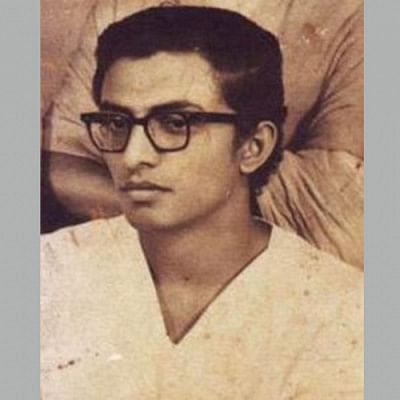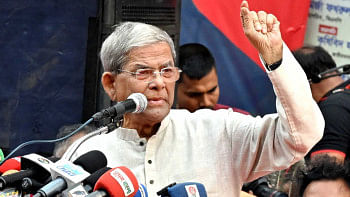Remembering the rebel voice of Kamal Lohani

In the early sixties, cultural activists and student bodies with different political affiliations, led by their university faculty, played a crucial role in demanding democracy and holding the Pakistani authoritarian regime to account. In 1966, I moved to Dhaka as a student. It was during this time I first met Kamal Lohani. The veteran journalist is known widely for his role in 1971 as the news editor of Shadhin Bangla Betar Kendra, which earned him the title of "Shobdo Shoinik", and his varied contributions to different news outlets, including as the director of Bangladesh Betar after independence. But at the time, our acquaintance was formed as cultural activists and through our left-leaning politics.
Many years later, Lohani Bhai told me that his "rebellious character" was first shaped during 1952. As a child, after losing his mother at six years of age, he was sent to live with his aunt in Kolkata. In his childhood, he said he had been "lucky enough to see the end of World War II and unlucky enough to see communal riots, but I lived through the greatest misfortune of all—seeing the nation fall apart in its bid to get rid of the colonisers." He returned to his hometown Pabna after Partition, and was preparing to sit for his matriculation exams when the February 21 massacre happened. The next day, there were protests across the country, and his spontaneous involvement in those protests shaped the beliefs that guided him throughout his life. As a student in Pabna, he was a member of the Student Union, and once in Dhaka, he became immersed in journalism and cultural activities as well.
When we met in the sixties, Kamal Lohani had formed a group called Kranti (this was after he left his position as general secretary at Chhayanaut from 1962 to 1966), through which he became one of the leaders of the cultural movement. I saw one of their performances at the Paltan Maidan, and I remember feeling inspired. By then, a few of us had established the University of Dhaka Shongskriti Shongshod and we wanted to organise events of the same calibre. It was through this cultural exchange that Lohani Bhai and I were introduced and came to know each other well.
I was surprised when I later found out that this sombre gentleman was not only a political and cultural activist, but a dance artist as well. His relationship with dance was another spontaneous turn in his life. In 1959, the Bulbul Academy of Fine Arts decided to create a dance drama based on the folk narrative of Bangladesh. Kamal Lohani was involved in organising the performance of Jasimuddin's Nakshikanthar Maath, which required the participation of around eight male dancers. When they were struggling to find enough men for the cast, he took it up as a challenge. He recounted later that the performance attracted such a huge crowd that poet Jasimuddin himself struggled to find a seat—no small feat at a time when there was a greater focus on classical drama over folk performances.
Although we were connected in our cultural activities, our political ideologies—like all of the left—were split along the Moscow and Peking schools of thought. Some of the Peking proponents had a "don't disturb Ayub" policy due to the close ties between Pakistan and China, and the Moscow supporters used it as ammunition against them. But it is important to mention that despite his support for Peking, Kamal Lohani was staunchly against autocratic rule. At the time, I was immersed in the student movement of the Sarbadaliya Chhatra Sangram Parishad under the leadership of DUCSU, which was part of a wider movement that demanded the autonomy of East Pakistan and the removal of Ayub Khan from power. And Kamal Lohani was at the frontlines of this anti-autocratic movement.
Another thing I remember from those days is the respect that Lohani Bhai showed for Bangabandhu. In fact, when Kamal Lohani was arrested in 1962, less than a month after his son was born, due to his involvement in the anti-autocratic student movement, he was jailed for three and a half months with some of the leaders at its forefront. He mentioned this in an interview with me, many years later, saying—"I consider it to be my greatest privilege that during those months, I was in the company of the heroes of Bangladesh, people whose names now make us bow our heads in respect. The first was of course our leader Bangabandhu, but I also had the privilege of knowing Abul Mansur Ahmad, Rafiuddin Ahmed Chowdhury and others. Bangabandhu used to fondly call me Captain, because I captained the volleyball team we had in prison."
We all know how he, like the rest of the nation, heeded Bangabandhu's call for freedom and contributed to the war effort in their own ways. He reached Kolkata in early May of 1971, and after Shadhin Bangla Betar Kendra officially launched at the end of that month, a dedicated team of journalists and artists worked everyday to bring the voice of the liberation struggle to the Bengali people. In December 1971, it was Kamal Lohani who read the daily bulletin from Shadhin Bangla Betar that announced the independence of Bangladesh—a memory that he fondly looked back on.
At one point, he became increasingly frustrated with the Bangladeshi left and moved away from active politics. He dedicated his life to journalism and culture instead, holding senior positions in different news outlets and cultural organisations. He contributed to Bangla literature and culture through his various writings and through his work as an editor. But in whatever he did, his rebel voice was heard.
Kamal Lohani was in one way, an uncompromising man. There was no compromising his beliefs. There was no compromise in his stance against autocracy, which was made clear once again through his involvement in the movement against Ershad. There was no compromise when it came to his support for Bengali nationalism, or his belief in a secular Bangladesh. And there was no compromising his conviction that without socialism, secularism and nationalism, there would be no free Bangladesh.
Asaduzzaman Noor is a Member of Parliament and cultural activist.

 For all latest news, follow The Daily Star's Google News channel.
For all latest news, follow The Daily Star's Google News channel. 



Comments